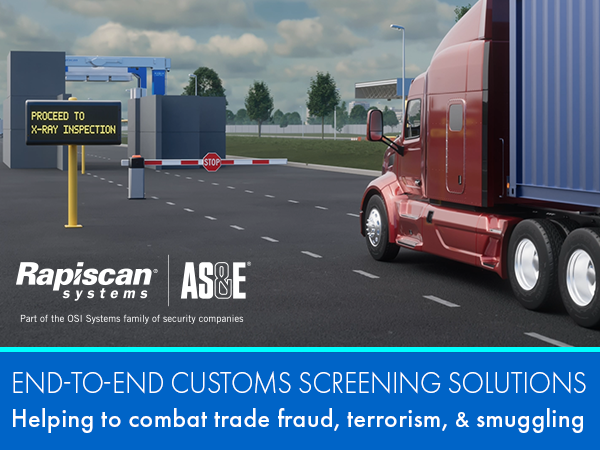Putting the partnership principle into practice: a look into Singapore Customs’ collaboration with authorities and stakeholders
21 February 2024
By Singapore CustomsThis year’s International Customs Day theme, “Customs Engaging Traditional and New Partners with Purpose”, resonates deeply with Singapore Customs. In the ever-evolving landscape of international trade, growing interdependence and technological advancements demand that we adapt, innovate and build meaningful partnerships to ensure efficient Customs procedures and smooth trade flows.
At Singapore Customs, we believe that trade is best facilitated by setting in place a trusted and rules-based system that ensures fair play for all parties. This requires us to engage domestic, regional and international partners. Only through partnerships can we provide a conducive environment for legitimate trade to flow seamlessly, fairly and safely in, out and through Singapore.
Collaboration to facilitate trade
Singapore Customs has been proactively working with like-minded Customs authorities to streamline Customs procedures, reduce trade barriers, and enhance understanding of one another’s regulatory frameworks.
Singapore is the member of the Association of Southeast Asian Nations (ASEAN), and Singapore Customs works closely with the Customs administrations of the bloc (Brunei Darussalam, Cambodia, Indonesia, Lao PDR, Malaysia, Myanmar (The Republic of the Union of), the Philippines, Thailand and Viet Nam) on various initiatives to promote economic integration and enhance the region’s trade competitiveness.
The implementation of the ASEAN Single Window has enabled the electronic exchange of the Certificate of Origin under the ASEAN Trade in Goods Agreement – known as the ATIGA e-Form D – and other trade-related documents among ASEAN Member States. The use of electronic documents saves time and money for the traders, as hard copy documents need not be couriered to the other ASEAN country.
The ASEAN Harmonized Tariff Nomenclature (AHTN) – an 8-digit Harmonized System (HS) Nomenclature based on the 6-digit HS Nomenclature developed by the WCO – also plays a crucial role in facilitating trade across ASEAN through consistent and uniform interpretation in the classification of goods.
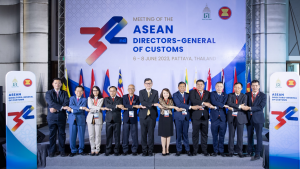
The ASEAN Customs Transit System (ACTS) was launched in November 2020 to allow traders to transport their goods with a single electronic goods declaration and banker’s guarantee. The System links Customs offices across a North-South corridor (through Thailand, Malaysia and Singapore) and an East-West corridor (through Cambodia, Lao PDR, Myanmar (The Republic of the Union of Myanmar) and Viet Nam). This benefits traders by minimizing delays for goods in transit within ASEAN.
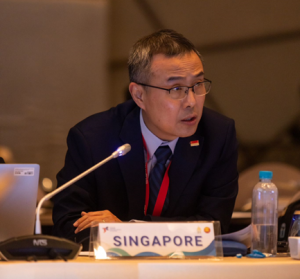
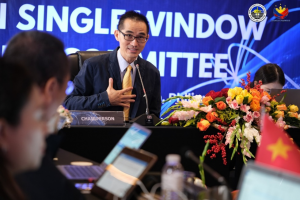
Beyond ASEAN, Singapore Customs has collaborated with local agencies and foreign partners on several bilateral initiatives to support Singapore’s role as a global trade hub. This includes the Track & Trace service that was developed jointly with the General Administration of Customs of the People’s Republic of China (GACC), the Maritime and Port Authority of Singapore (MPA) and PSA Singapore, the port operator. The Track & Trace service seeks to mitigate port congestion and supply chain bottlenecks by allowing Singapore businesses to access the Container Tracking Frontend Application on Singapore Customs’ Networked Trade Platform (NTP) – Singapore’s one-stop trade and logistics ecosystem which supports digitalisation efforts and connects players across the trade value chain in Singapore and abroad. The Track & Trace application provides timely updates on the logistics and cargo clearance status of containerized shipments from Singapore to China or vice versa. With improved visibility of the status and location of their shipments, businesses are able to perform better logistics planning and improve on delivery times.
The NTP also enables the exchange of electronic sanitary and phytosanitary certificates (e-SPS) with international partners. Together with our National Parks Board (NParks) and the Singapore Food Agency (SFA), Singapore Customs rolled out the e-SPS enquiry service on the NTP in 2023. The service allows traders to retrieve the e-SPS issued by overseas competent authorities in Australia and New Zealand. Besides minimizing the risk of fraudulent, delayed or missing certificates, it also saves time and costs for traders as they no longer have to wait for the hardcopy SPS to be couriered to them.
More recently, Singapore Customs, the Immigration and Checkpoints Authority (ICA), the Inland Revenue Authority of Singapore (IRAS), and PSA Singapore took the step to simplify Customs procedures enabling vehicle manufacturers to move goods for which Goods and Services Tax[1] has been paid, from their warehouses in the Free Trade Zone to their manufacturing facilities. This is expected to result in potential time savings of about 1,600 man-hours per month.
On the multilateral front, we are actively involved in discussions to push for more measures requiring active collaboration between countries, including those related to the implementation of Self-Declaration of Origin for Free Trade Agreements and Regional Trade Agreements at the Asia-Pacific Economic Cooperation (APEC) forum. Under self-certification schemes, businesses can issue a certificate of origin as a means of declaring or affirming the originating status of goods. Such a measure would greatly reduce the administrative burden of trading for businesses and enable them to better take advantage of preferential tariff rates offered under FTAs or RTAs.
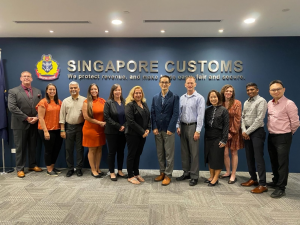
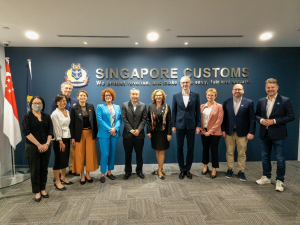
Intra- and inter-agency cooperation to fight illicit trade and secure the supply chain
Recognizing that organized smuggling syndicates are increasingly exploiting global supply chains to distribute illicit products, Singapore Customs has increased its collaboration with like-minded international partners to disrupt illicit distribution channels. For example, we work closely with the Australian Border Force (ABF) and the United Kingdom’s His Majesty’s Revenue and Customs (HMRC) to share crucial information and intelligence on suspicious shipments transiting through Singapore and bound for other markets. Referrals to the ABF and HMRC have led to the seizures of millions of contraband cigarettes which were concealed using various methods, such as the false declarations of goods and the use of cover loads.
Domestically, we work with ICA and the Singapore Police Force (SPF) to send a strong signal to criminals that the law enforcement agencies in Singapore are proactive in curbing crime, including the smuggling of illicit tobacco. Along with NParks and ICA, we also conduct joint operations against illicit wildlife trade. In 2019, Singapore Customs, NParks, ICA and GACC authorities received a UN Asia Environmental Enforcement Award for the seizure of 11.9 tonnes of pangolin scales and 8.8 tonnes of elephant ivory which transhipped through Singapore. The seizure took place after GACC officers shared the relevant intelligence with the Singapore authorities following the arrest of wildlife traffickers in China.
In 2002, Singapore was the first port in Asia to join the United States Customs and Border Protection’s (CBP) Container Security Initiative (CSI). The CSI regime seeks to ensure that all containers which pose a potential risk for terrorism are identified and inspected at foreign ports before they are placed on vessels destined for the United States. Over the years, Singapore and the U.S. have continued to reaffirm our joint commitment to work closely in addressing the security of the global supply chain.
Singapore Customs has also pursued Authorized Economic Operator (AEO) Mutual Recognition Arrangements (MRAs) with key jurisdictions to foster trust and recognition between Customs administrations. AEO MRAs are cornerstones of secure trade as they not only streamline cargo clearance processes, but also strengthen border control by allowing resources to be focused on high-risk shipments. To date, Singapore Customs has bilateral AEO MRAs with Australia, Canada, China, Chinese Taipei, Hong Kong, China, Japan, Malaysia, New Zealand, the Republic of Korea, Thailand, the United Kingdom and the United States. We also have a multilateral MRA with the other nine ASEAN Member States to recognize one another’s AEO programmes.

Innovation and partnership with new stakeholders – the way to go
Our longstanding collaboration with fellow Customs authorities, law enforcement agencies and business communities has been instrumental in furthering the mission of Singapore Customs to collect and protect our revenue while facilitating trade.
Aside from working with traditional partners, we must embrace innovation and forge partnerships with new stakeholders. In an era defined by rapid technological advancements, we must, among other things, actively engage the private sector, technology providers, and other non-traditional partners to harness and tap into their innovative mindsets and practices.
As Singapore Customs continues to evolve in tandem with the dynamic landscape of international trade, our emphasis on building and strengthening partnerships will continue to be our core strategy.
More information
Customs_international@customs.gov.sg
[1] Goods and Services Tax in Singapore is a value added tax of 9% levied on import of goods, as well as most supplies of goods and services.

